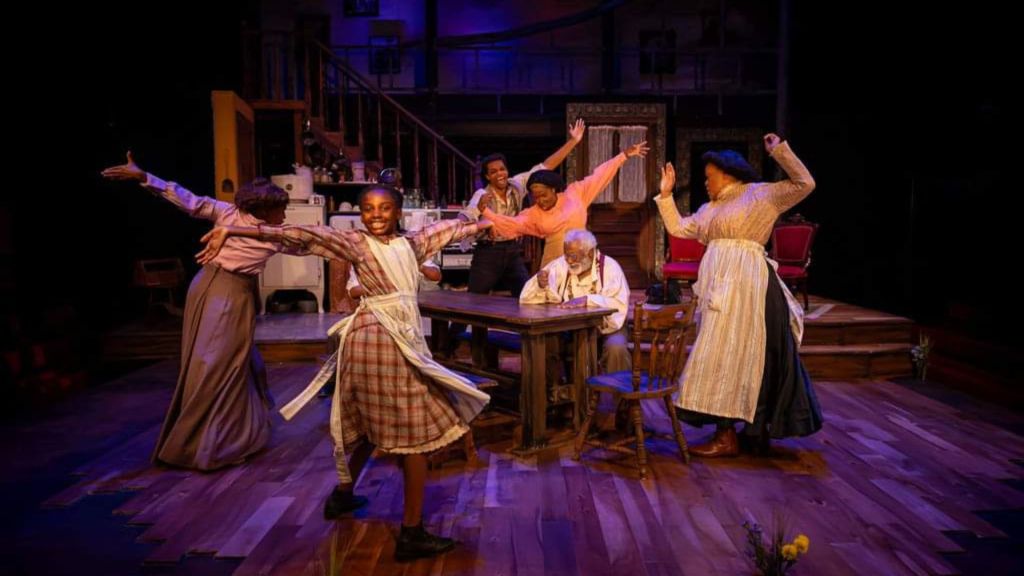By Nyame-kye Kondo
Special to the AFRO
Chesapeake Shakespeare Theatre’s production of “Joe Turner’s Come and Gone” is now in its final weekend.
The play is the second installment in a series written by August Wilson, called “The American Century Cycle,” (also known as the “Pittsburgh Cycle”), which chronicled the Black experience in America during the decades of the 20th Century.

Photo: Photo courtesy of Chesapeake Shakespeare Theatre Company/ Photos by Kiirstn Pagan Photography
The current production of “Joe Turner’s Come and Gone” is directed by KenYatta Rogers, and is part of a three-year initiative in Baltimore aimed at celebrating Wilson. Theaters around the city are producing all 10 of Wilson’s plays chronologically for the first time in history. The first was “Gem of The Ocean,” which premiered at Arena Players in April.
“Baltimore has a vibrant, but siloed theatre community,” said Lesley Malin, producing executive director of the Chesapeake Shakespeare Company, in a statement. “Seemingly, there has never been a time when Baltimore theatres have worked together for a common artistic goal – a festival of productions. Until now…”
“Joe Turner’s Come and Gone” is a piece of work that leaves not only space for the story of Blackness to be told, but for it to be reinterpreted for years to come.
August Wilson’s writing is the epitome of good storytelling. From the dialogue itself to the choices made by Rogers, Wilson’s writing is and forever will be, a stellar guide.
Written in 1984 and published and staged for the first time in 1986, “Joe Turner’s Come and Gone” is set in 1911 and takes place primarily in a boarding house during the Great Migration, a time where African Americans moved in droves from the American South in search of opportunities in the big cities of Chicago, Detroit and Pittsburgh. It follows the nomadic journey of mysterious traveler Herald Loomis, played by Josh Wilder, and his daughter Zonia Loomis, portrayed by young actress Kenya Mitchell, as they search for his long-lost wife in Pittsburgh.
The varied and colorful characters Loomis encounters in the boarding house, each on their own journeys, become important catalysts for a cathartic release. The result is a vivid exploration of spirit, transcendence and the human ties that bind.
Reimagined in the intimate but unique space of the Chesapeake Shakespeare Theatre in Downtown Baltimore, the set design includes a small kitchen, with a dining table, and a stairway that leads to an upper level. Rogers’ directorial vision is complimented by the unique stage lighting, illuminating the space while the intentionality of the set subtly acts as a necessary intermediary for character development.
“Chesapeake Shakespeare’s thrust stage provides the perfect space to explore the themes of faith and sacrifice, isolation and belonging, bearing witness to the resilience, creative spirit within the Black American community,” Rogers noted in a press release. “Redemption comes from within and without, and utilizing elements of design and performance, we are crafting an immersive experience that connects ancestor to performer, performer to audience member, and audience member to one another as well as to themselves.”
It is obvious that Wilson’s words resonate with the actors, with thespians such as Jefferson A. Russel commanding the audience’s attention in the role of Seth Hall, the owner of the boarding house.
Mecca Verdell, a staple of the regional Arts scene, plays the character Molly Cunningham. Verdell spoke to the power of Wilson’s words:
“August Wilson was able to write about communities and how they operate in a real, heartfelt and powerful manner. The characters in each decade are truly human in whatever circumstances they are. I think everyone should absorb Wilson’s work because it’s Black stories that are unapologetically Black without explaining what it means to be Black to Black people,” she said. “You have to pay attention to everything that August Wilson is putting inside the writing. Nothing is by accident. As a poet myself, I was able to pick up on how August Wilson layered imagery and metaphors …The play is much like a poem to me. A poem has repeating verses that keep finding themselves until it has new meaning. Much like these characters.”
Verdell told the AFRO that she was familiar with Wilson’s plays via the work of Phylicia Rashad and Viola Davis, who have popularized the playwright’s work for younger generations. However, this is the first time she’d been in a play written by Wilson.
“This feels like one of those moments where all the work I’ve done as a performer has led me to this,” said Verdell. “I had a mission this year to only do Black, contemporary work and being a part of this August Wilson Celebration means so much. This work gives me a sense of freedom to be as authentic as I like —being a Black actor— while also making me a student with every performance we have.”
It’s young artists like Verdell that link younger generations to Wilson’s timeless work.
“He really depicted what was going on in the 1900s and how slavery destroyed the Black family,” said theater patron Damien Maddox. “All of his plays depict something that was relevant then and is still relevant now. It’s like we can’t break the cycles.”
The post ‘Joe Turner’s Come and Gone’ in final weekend at Chesapeake Shakespeare Theatre appeared first on AFRO American Newspapers.











